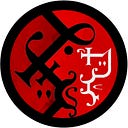The Sacred Dæmon Kingdom
Trions don’t value any land untouched by the sea and have lent, given away, or sold most of the interiors of their archipelago’s islands. For this reason, the Confederacy’ has become a refuge to all kinds of dissidents, rebels, and heretics: anyone who wants to build their utopia, haven, or stronghold can find a place there.
The Sacred Dæmon Kingdom is one of the oldest and most successful of these “unorthodox” enclaves, despite having foundations of pure delusions and rancor.
The Dæmons are people with infernal blood, akin to the infernal aristocracy, and they are sure they are the legitimate ruler of the territories known as the “Holy Infernal Empire”.
Not everyone who fought against the Angels was happy with the birth of the Holy Infernal Empire.
The Devils, who led the infernal nation’s founding, were fiercely opposed by the Demons, who didn’t want any form of state limiting their freedom to pursue the annihilation of the Celestial Inheritors. They eventually attempted a coup and sacked Goetia, the capital city: for this, they were hunted down and reduced to small communities hidden in unhospitable places.
But Demons were not the only opposition to the Empire.
After the sack, some noble families, led by House Yugoloth, questioned the rule of House Asmodeus. They attempted to overthrow the election of the third emperor, empress Lylith I, with the unspoken but clear objective of taking the title to abolish it, making it a kingdom. The Yugoloths and their supporters tried to sway the nobles with the prospect of a stronger, more united and focused nation.
They called themselves the Dæmon, an old word from the world before the war, to evoke the past divine glory they would surely bestow on the land.
They failed, nobody followed their rallying cry, and their only success was to escape before being caught, executed, and condemned to an eternal unlife of pain.
The dæmons, exiled on a handful of islands of the Triton Archipelago, created the kingdom they envisioned, swearing one day to get what they deserved.
The start was promising: they took riches and trusted allies, such as powerful wizards and clerics; they found some gold and metal deposits in the islands; and the tritons were happy to collaborate with them, enriched by their technology and knowledge.
But, for a while, things got bad: their curse was their obsession with going toe-to-toe with the Holy Infernal Empire, attacking it directly, risking sabotages, kidnapping, and even conquest. In each campaign they were regularly outnumbered and defeated, even pushed to the brink of extinction a couple of times.
In the V century, the Empire attempted the conquest and occupation of the Triton peninsula. The dæmon’s ancestral hatred for the “unworthy devils” became a catalyst for the resistance’s forces and eventually a cornerstone for the founding of the Confederacy.
Now the Sacred Dæmons’ Kingdom is one of the major players in the Confederacy, often proposing more proactive politics and pushing for more cooperation (under their oversight, of course).
Daemons are the main force behind the creation of Corsair Fleet, the “navy” of the Confederacy: they were the ones to welcome and support disgraced noble Typhonio of House Belfagor who, with his strategic genius and ship-faring talents, troubled the Empire for years and create the basis of the Corsairs.
Piracy is one of the main “industries” of the dæmon kingdom, which they justified as “taking back what should be theirs”.
Century after century, the grievances of the dæmons became bigger and bigger, amplified by a chain of stories and legends more and more dramatic each time they are retold. Now dæmons are convinced to be the real heirs of the archdevils and the Empire, hunted down by imposters in a methodical ethnic cleansing.
Similarly, their customs and art harken back to ancient times but are, in fact, deformed by the passing of time. Dæmons don’t acknowledge that: to them, they are exceptionally faithful to their heritage.
For example, The dæmonic language is as far as the “ancient tongue of the archdevils” as is Imperial Infernal, but the dæmons would never concede that. Art, fashion, cuisine, music… all try to be faithful to the style of old while being actually progressively twisted and deformed.
But one thing, in particular, will strike as genuinely from a bygone era: the Imps. Dæmons still breed Imps, flying monkeys used as helpers and pets, while in the Empire are falling out of fashion and almost extinct.
The one thing they could not rewrite in their history books is their peculiar asymmetrical horns. This recessive trait became common due to the small size of the starting marital pool and some population bottlenecks caused by the early disastrous military campaigns. They are very proud of that, they see it as a sign of their “persecution”, but, since the symbol of house Yougoloth is a stylized ram head, they couldn’t claim it as a sign of their “purity” and “legitimacy”.
Dæmons have the “right of blood” as a founding myth, but they could never afford the rigid marrying law of the Empire: in the Sacred Kingdom nobles and commoners can marry without legal repercussions. Most people have at least some fiend blood, even the maids and the farmers have small horns, skin with uncommon undertones, and bright flaming eyes.
Dæmons have the fame of entitled cry bullies that use blown-out ancestral abuse as an excuse for predatory behaviors. Something that many would say they have in common with their Infernal Cousins. The Dæmons, of course, will deny it with all their strength accusing those who spoke that “infamy” of not comprehending their rightful plight.
